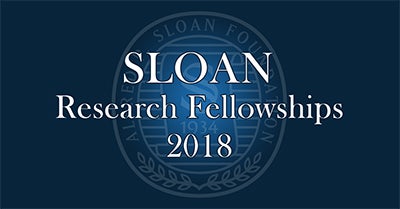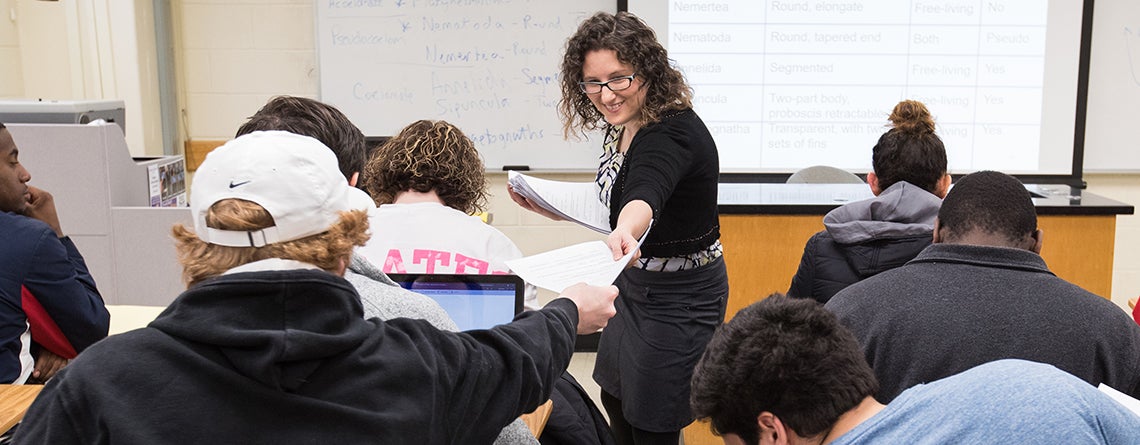RESEARCH RECOGNIZED
ECU assistant professor receives distinguished fellowship
An East Carolina University assistant professor of biology received a prestigious fellowship Thursday, Feb. 15, as she was recognized as one of 126 recipients of the 2018 Sloan Research Fellowships.
Dr. Rebecca Asch, whose work at ECU focuses on the effects of climate change and climate variability on marine ecosystems, has been acknowledged by the Alfred P. Sloan Foundation as one of the top early-career researchers in the United States and Canada. The fellowships have been awarded annually since 1955 and include 45 Nobel Prize winners.

Fellowship awards were announced in a full-page advertisement in The New York Times.
This year’s selections were drawn from 53 colleges and universities in eight fields including chemistry, computer science, economics, mathematics, computational and evolutionary molecular biology, neuroscience, ocean sciences, and physics.
Asch, whose recent work has been reported in national outlets such as New York Times, Los Angeles Times, CNN, NPR, FOX, Newsweek and The Huffington Post, said she was “shocked” to receive the honor.
“I was really excited,” Asch said. “There was a lot of hesitation when I opened the email. I had to pause reading it to make sure that I’d received the fellowship.”
Asch’s work focuses on how warming oceans are leading some marine species to change their reproductive habits, causing them to reproduce at different times of the year than in the past and affecting the way they interact with their food sources. Asch said that climate change effects evident on land made her wonder what effects were being felt by marine life.
“On land we see that plants are blooming earlier and animals are migrating earlier in the season, so I wanted to see if these kind of effects were happening in the ocean as well,” she said. “I really wanted to see if these changes between fish and their food sources were happening in sync, or if these changes could reshuffle food webs because habitats are changing quicker than fish or their food sources can keep up with.”
Asch’s work spotlights the early life history of a fish’s lifecycle, including the egg, larvae and juvenile stages. She believes it is important to understand how climate change affects these stages since they influence the productivity of commercially important fisheries and due to the future need for protein from marine sources to support growing human populations.
“In the future, we’re going to have a larger population that we’re going to have to support,” she said. “A lot of the protein needed to feed that population, especially in the Pacific, comes from marine sources. This ties into how we can best manage our fisheries in the future.”
Asch said her love for the environment began at an early age.
“Two things really brought on my interest in the environmental sciences,” Asch said. “First, my dad was very passionate about hiking. He took me on hiking trips with him and instilled a conservation ethic. Second, I remember being in middle school and seeing a documentary in science class about changes happening in the rain forest. They talked about climate change being an emerging issue.
“The narrator commented on the fact that climate change would affect the kids and grandkids of the current generation and I thought ‘Hey, he’s talking about me.’ That really connected with me and made me realize that climate change is something my generation, and the generations to come, are going to have to face. Anything I can do to help prevent or mitigate it is important to me.”
Asch said that along with her climate change work, an important part of her job is to teach her students how to take care of the environment.
“I want to teach our students at ECU how to be good environmental citizens,” she said. “Even if they go work in a different field, they’ll still be making decisions that impact the environment. If I can help them make good decisions, that’s important to me.”
Sloan Research Fellowships are available to tenure track faculty in eight scientific categories. Candidates are nominated by fellow scientists and are selected by an independent panel of senior scholars in their field on the basis of a candidate’s research accomplishments, creativity and leadership potential.
Asch will receive a two-year, $65,000 fellowship to further her research.
Dr. Jeffrey McKinnon, ECU biology professor and chair, said Asch should be very proud of the honor.
“We are extremely proud of Rebecca and immensely pleased for her,” he said. “This is one of the highest honors to which an early-career American scientists can aspire. It confirms both the scientific and societal importance of her work – which focuses on how a changing climate impacts fisheries and marine ecosystems – and her tremendous talent for research.”
The Alfred P. Sloan Foundation is a philanthropic, nonprofit, grant-making institution. Established in 1934 by Alfred Pritchard Sloan Jr., then-president and chief executive officer of the General Motors Corporation, the foundation makes grants in support of original research and education in science, technology, engineering, mathematics and economics.

Asch is one of 126 recipients of the 2018 Sloan Research Fellowships. The fellowships are presented annually to the top early-career researchers in the United States and Canada.
